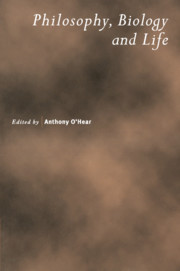Book contents
- Frontmatter
- Contents
- Preface
- Notes on Contributors
- Transcending the Emergence/Reduction Distinction: The Case of Biology
- Other Histories, Other Biologies
- The Ontogenesis of Human Identity
- Souls, Minds, Bodies and Planets
- Evo-devo: A New Evolutionary Paradigm
- Is Drift a Serious Alternative to Natural Selection as an Explanation of Complex Adaptive Traits?
- Evolution and Aesthetics
- The Problems of Biological Design
- Are there Genes?
- Folk Psychology and the Biological Basis of Intersubjectivity
- The Loss of Rational Design
- Under Darwin's Cosh? Neo-Aristotelian Thinking in Environmental Ethics
- The Cultural Origins of Cognitive Adaptations
- Name Index
Transcending the Emergence/Reduction Distinction: The Case of Biology
Published online by Cambridge University Press: 07 May 2010
- Frontmatter
- Contents
- Preface
- Notes on Contributors
- Transcending the Emergence/Reduction Distinction: The Case of Biology
- Other Histories, Other Biologies
- The Ontogenesis of Human Identity
- Souls, Minds, Bodies and Planets
- Evo-devo: A New Evolutionary Paradigm
- Is Drift a Serious Alternative to Natural Selection as an Explanation of Complex Adaptive Traits?
- Evolution and Aesthetics
- The Problems of Biological Design
- Are there Genes?
- Folk Psychology and the Biological Basis of Intersubjectivity
- The Loss of Rational Design
- Under Darwin's Cosh? Neo-Aristotelian Thinking in Environmental Ethics
- The Cultural Origins of Cognitive Adaptations
- Name Index
Summary
Introduction
The groups of problems that fall under the titles ‘reduction’ and ‘emergence’ appear at the boundaries of seemingly independent and well-established scientific disciplines, such as chemistry and biology, biology and psychology, biology and political theory, and so on. They arise in this way:
There is a widespread intellectual ‘urge’ towards developing a common discourse for adjacent disciplinary practices such as biology and chemistry, biology and psychology, law and psychiatry. To achieve this goal a unified and coherent system of concepts would be required that would be adequate to describe and to explain the phenomena which are the subject matter of both disciplines.
There is a discontinuity between the concepts native to each of the adjacent disciplines in that predications from each to a common subject such as a sample of a material substance, or a process or a human being, appear to be incompatible. For example to describe a certain reaction as ‘reducing’ and to describe it in terms of the quantum states of molecular orbitals is an incompatible predication. For example to say that a brain is thinking and that that brain is taking up glucose is an incompatible predication since the criteria for these assertions are radically different. Or, to say that a human being is ill and to say that a human being is malfunctioning is an incompatible predication, since the former requires the speaker to treat the human being as a person, and the latter as an organism. Just what these various differences amount to will be the main aim of this paper.
- Type
- Chapter
- Information
- Philosophy, Biology and Life , pp. 1 - 20Publisher: Cambridge University PressPrint publication year: 2005



